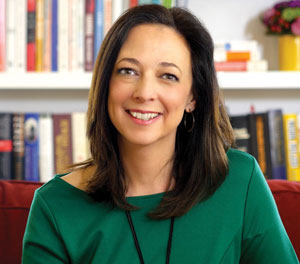Most lawyers are introverted, and that's not necessarily a bad thing

Airina Rodrigues. Photograph by Arnie Adler.
Rodrigues, who is an intellectual property associate at DLA Piper in New York City, has long identified herself as an introvert. A former competitive figure skater, Rodrigues doesn't mind performing or being in court. Rather, "being an introvert is really about how I approach problems and how I recharge," she explains. "I'm not shy, but I find networking draining. I love meeting new people, but it requires extra energy."
When Rodrigues discovered the best-selling book Quiet: The Power of Introverts in a World That Can’t Stop Talking, written by former lawyer Susan Cain, it became one of her favorite books because she recognized herself in it. Quiet explores how extroversion has permeated our culture and how society as a whole undervalues introverts.
After reading Quiet, Rodrigues started thinking about what introversion means for law practice. “I wondered why I’m a content lawyer and like private practice when that’s not a universal experience,” she says. “I have my own office. I’m not at a tech company or a startup that prides itself on having an open office. I have privacy, stability and I can focus on work. I enjoy in-depth research, writing and working on briefs. Introverts really thrive at the problem-solving aspect of law.”
Contrary to popular belief, most lawyers are not extroverts. In fact, 60 percent are introverts, according to Eva Wisnik, president of the legal training and placement firm Wisnik Career Enterprises in New York City. Wisnik has given the Myers-Briggs personality test to more than 6,000 attorneys since 1990.

Susan Cain. Photo Courtesy of Susan Cain.
“It’s not something you’d intuitively think, particularly when you think of litigators,” Wisnik says. “But it makes sense. Many lawyers spend a lot of time by themselves—reading, writing, thinking—compared to other jobs where the majority of the work is interacting. Introverts make good lawyers, especially for clients who want a thoughtful answer.”
When Quiet author Cain started her career as a lawyer, she figured that to be effective she’d have to transform herself into a commanding figure—the kind of lawyer who marches into a courtroom or a boardroom. “But when I looked around, I saw that many lawyers weren’t like that,” recalls Cain, a 1993 graduate of Harvard Law School. “Instead, they exercised power in a different way. They were more measured and deliberate.” That approach, she was surprised to discover, inspired the trust of both clients and adversaries.
Working as a transactional lawyer suited Cain’s temperament. “I’m introverted in my ways of getting things done,” explains Cain, who practiced at Cleary Gottlieb Steen & Hamilton. “I’m not overly adversarial, and clients appreciated that. I really enjoyed many aspects of law practice: the state of flow, putting my head down and working.”
After seven years, Cain left the law, went on to write Quiet and gave a 2012 TED Talk on introversion that has been viewed more than 12 million times online. According to the Quiet rubric, introverts gain energy from quiet reflection and solitude. They tend to think before they speak, take a deliberate approach to risk and prefer listening. While not necessarily shy or anxious in social settings, they’re usually not comfortable in groups. Introverts are energized by focusing deeply on a subject or activity that truly interests them and may become overwhelmed in stimulating environments.
Extroverts, by contrast, are valued by society for commanding attention, and they are the kind of people Cain expected to encounter in the legal profession. Extroverts usually love crowds because they get energized by interacting with people. They’re typically assertive go-getters who can think on their feet, are relatively comfortable with conflict, and often grow bored or restless in quiet environments. While most people usually have attributes of both extroversion and introversion, the majority of adults are extroverted.
KNOW YOUR PERSONALITY
Most major personality tests—including Myers-Briggs and the Newcastle Personality Assessor—measure introversion or a similar personality trait. It’s worthwhile to learn your own preferences related to decision-making, focusing mental energy, gathering information and dealing with others, notes tax lawyer and psychologist Joshua Rosenberg, who studies the role of human behavior and psychology in law at the University of San Francisco School of Law. “The more you know about yourself, the better off you are. You then can decide how you’re going to act, as opposed to acting out of habit or unconsciously.”
Thanks largely to interest generated by Cain’s book, law schools and law firms have begun using introversion preferences to inform hiring and placement decisions and to groom young lawyers to be more effective. Temperament tests can help lawyers and firms identify which law students and attorneys fit with a particular corporate culture, whether they’re practicing in the right specialty or are matched with suitable mentors and clients.

Jennifer Rakstad. Photograph by Wayne Slezak.
“Cain’s was the right book at the right time,” says Larry Richard, the founder of management consulting firm LawyerBrain and an expert on the psychology of lawyer behavior. “Lawyers and law firms are more aware of and interested in psychology in general as a way to manage increasing stress. They’re taking part in the broader trend—it’s palpable. Twenty years ago, it was like pulling teeth getting firms interested in anything psychological.”
Richard, who is both a lawyer and a psychologist, notes that effective leadership is built on relationships. “And you build a relationship by getting others to relate to you, getting them to ask: ‘How are you like me, and how are you different from me?’ So both lawyers and their leaders must understand introversion. For example, as a leader you don’t want to just go barging into someone’s office and announce why they should accept an initiative you’re proposing.”
FIRMS TURN TO TESTS
RELATED ARTICLE
• 15 signs you may be an introvert
WEBINAR
Are you an introvert or an extrovert? Join the ABA Journal from 12:30-2 p.m. CT on Thursday, Feb. 4, for Introvert Power!—a webinar on the power of introversion. In this program, you’ll learn to use your personality traits to your professional advantage. And employers will learn why it’s important to know whether someone is an introvert or an extrovert when it comes time to hire. Free for ABA members and $50 for nonmembers. To register, click this link.
As law firms acknowledge the importance of temperament, personality testing in the profession is on the rise, Richard adds, citing trends he’s witnessed in his own practice during the last three years. He uses personality testing to help law firms improve business development, resolve conflict, decide who to hire, assess lawyers for promotion, evaluate leadership and engage in succession planning.
Jennifer Rakstad, a career development adviser at Mayer Brown in Chicago, administered the Myers-Briggs test to associates for many years and now uses a similar test that measures lawyers on a spectrum ranging from reserved to outgoing. “It’s a tool that provides insight on how they can best use the strengths of their personality,” she explains. “We learn about communication style, how a particular person deals with stress; and whatever the result, we coach them on ‘flexing’ to meet someone else’s style.”
When Cain speaks about introversion, attorneys often approach her and confess that one of the challenges they face is figuring out how to refresh. “Law is so demanding, so consuming, and there’s not space in the day to recharge,” she says. “I hear a lot from lawyers who are starting to rethink how they can add recharging into their day. That starts in an emotional space: You need to know who you are and know that you’re entitled to what you need.”
For lawyers looking to adapt this way, Cain recommends booking their calendars differently. “If you have a day full of negotiations or court appearances, make sure to book in a solitary lunch or coffee with yourself. Don’t be afraid to close your door or go for a walk,” Cain says. “A lot of people feel guilty about this, but it should be precisely the opposite. The more you recharge, the more present you’ll be for other people.”

Eva Wisnik. Photograph by Len Irish.
After Quiet was published, Cain expected to move on and write another book. But the response was so great—and Cain received so many questions about how to “harness the talent of the introverted half of the workforce”—that she took the concept a step further, founding the Quiet Leadership Institute. Blue-chip companies like Procter & Gamble and General Electric have turned to the institute for e-courses and live workshops about how introverts can advance in careers and how extroverts can manage introverts in the workplace.
In 2014, the Portland, Oregon, office of international firm Perkins Coie presented a program for attorneys and staff on this exact topic, says Danielle Benderly, chair of the firm’s diversity committee in its Portland office. The firm bought copies of Quiet and conducted an internal survey about the firm’s makeup. Slightly more than half were introverts, Benderly says. Since the program, Perkins Coie has acquired noise-canceling headsets and configured some smaller workspaces with doors that shut. The goal, Benderly says, was consciousness raising, particularly because 90 percent of Perkins Coie survey respondents believed the practice is set up for extroverts.
PEER PRESSURE
Even though most lawyers are introverts, many systems exist that may be easier for extroverts to navigate. “Look at the business of practicing law: how we attract clients, the whole profile of the rainmaker,” Benderly explains. “There’s an emphasis on public speaking and being out in the community and being a representative of your organization. It’s the same with the impression you make on your colleagues in the office.”
Indeed, society at large is partial to extroverts, Wisnik says. “From the time they’re young, kids hear, ‘Go outside and play.’ So most people have learned to operate in an extroverted world. If your natural preference is introversion or you’re on the border, you learn to be extroverted because that’s what’s expected. There’s pressure towards that.”
For her part, Benderly tests out slightly extroverted. “I do a lot of public speaking and I’m very social. But I also do really good thinking by myself, so this profession is a good fit for me. I’m a business lawyer and I spend all day interpreting securities laws,” she says. “I’m talking to people and I’m doing work with my head down, and that makes me very happy.” She adds that the profession “has a lot to offer both introverts and extroverts. I’d be a miserable trial lawyer. You just have to figure out what works best.”
An extreme extrovert may be drawn to different kinds of law than an extreme introvert. “My husband scores on Myers-Briggs like a race car driver,” Wisnik says. “He’s action-oriented and needs variety. We spent a lot of time figuring out what kind of law he should practice. He became a bank closing attorney. It’s one constant fire drill. It’s all about intensity, uncertainty and crisis management. I would have a panic attack. To me, that’s like working in an ER. But his personality style matches what that practice needs.”
ANY TYPE CAN FLOURISH
Though the legal profession tends to attract introverts, both types can thrive in law, Cain insists. Many attorneys—such as district attorneys and public defenders—are extroverts who thrive on being in court and in negotiations all day. Importantly, too, introverts can absolutely do extroverted things—it just may not be in their comfort zone. For instance, while extroverts are likely drawn to trial work, not all trial lawyers are extroverts, Wisnik says. “For introverts, trial work is a performance. They’re like those actors who are introverted—they can do it, but it exhausts them.” Because they’re internal processors, introverts are often excellent listeners, Wisnik adds. “That is a great asset in client development and representation.” Interestingly, she’s found that nearly 90 percent of intellectual property lawyers are introverts. (Not surprisingly, DLA Piper’s Rodrigues is an IP lawyer.)
It’s tempting to confuse introversion with a lack of assertion, shyness or arrogance. But they’re not the same thing, Wisnik explains. Rather, it’s about whether someone does most of their processing internally or prefers to talk it out. “When you’re asked a question, do you pause, look away and go inside to process? That’s introversion. Extroverts talk and then think. And they get their energy from getting on the phone or seeing someone.”
While extroverts may be confident and charming, Wisnik cautions law firms not to hire attorneys based on those qualities alone. “I tell them not to be biased towards the talkative, articulate candidates because those characteristics aren’t necessarily those that breed success in the legal profession,” she says. “They don’t directly mean that person will be a good lawyer. They may be confident and charming, but they may walk around the office instead of doing their work.”
JOB SEARCH DEPENDS ON STYLE
Sari Zimmerman, assistant dean for the Office of Career & Professional Development at the University of California’s Hastings College of the Law in San Francisco, tests students and alumni with Myers-Briggs to determine their spot on the introversion scale. “It informs how we approach the job search and careers, and how we relate to colleagues,” she says. “We’re often coaching students and grads for that classic milestone—the interview—which is essentially an extroverted activity. Introverts can be good at interviewing, but it’ll drain their battery. If you know you’re an introvert, you might approach the interview differently. Preparing in advance frees up energy for the exchange.”
Understanding temperament can also inform where students should focus their job search. An introvert could be a great appellate attorney, for example. “It’s very cerebral; it’s you on your own with the trial record in front of you,” Zimmerman says. But the Myers-Briggs test is highly nuanced, she cautions. “Just because you’re an introvert doesn’t mean you’re bad at extroverted things like oral advocacy or client counseling. It simply means that doing those things may drain your battery. When you’re looking for a job, think about whether you want to be in direct legal services where you’re constantly in front of clients. Ask [yourself] whether you’ll like an open architecture office. For some introverts, that could be pretty draining.”
But Myers-Briggs and similar tests shouldn’t be used as a hiring tool alone, Wisnik says. “It’s not a measure of motivation or ability. It doesn’t mean that you have writing skills or problem-solving skills,” she explains. “It is helpful in terms of work style. A firm’s particular culture may be extroverted: There may be people in the hall mingling, doors open. In that case, you might see if you can determine what’s motivating an introverted person to apply to your firm.”
Also, the introverted-extroverted classification is not an absolute but a spectrum that can shift in a person’s professional or personal life. “I know a woman who in the workplace was very introverted. She had her door closed and did her work privately,” Zimmerman says. “But in her social life, she was very extroverted—she traveled in groups and was a great party-thrower.”
PUT YOUR STYLE TO WORK
Being an introvert may emerge not so much in the work itself but in another essential element of lawyering: building a client base. “In business development, it comes up often,” Mayer Brown’s Rakstad says. “Sometimes a senior associate will tell me: ‘I don’t like networking events. How can I gain a book of business?’ I send them Susan Cain’s video on how to network as an introvert. I tell them that instead of group events, they can ask a client out to lunch and connect with people one-on-one, which can potentially build a more in-depth connection.”
Introversion also influences relationships with existing clients, says Jessica Natkin, director of attorney career development at Fenwick & West in San Francisco, who recalls one instance in which an introverted associate was told in performance reviews that she was too withdrawn and quiet in client meetings. To advance, the associate needed to start speaking out and making her opinions and presence known. “Together, we worked on planning ahead,” Natkin says. “For example, she had a client meeting coming up. I advised her to learn the agenda, approach the partner and suggest, ‘I’ll take these three points.’ It was definitely out of her comfort zone, but we made it a specific goal for a specific meeting.”
Knowing not just your own temperament but the personality preferences of your clients and colleagues is also critical, according to Zimmerman. “If you’re an introvert with an extroverted client, that client might want answers quickly and you may need to communicate differently.” Similarly, if you’re working with introverted colleagues, offer to give them questions in advance, “which gives them time to think it through,” a style in which they’re more likely to excel.
Like any field, the legal profession needs all types of people. Knowing your introverted/extroverted inclinations can help you make choices that align with your nature and don’t deplete you. Introversion is “one of a constellation of factors,” Zimmerman notes. “We can overlabel, overexaggerate the significance. It’s nuanced. Just know your type and your preferences. As with any self-assessment tool, take what works for you and discard the rest. No one attribute can define a person.”
As for Rodrigues, she’s found that as she grows more senior at her firm, she has more client contact and increased responsibility for managing junior associates. Both require the introvert to adapt—and she’s honed some new skills in the process. “I’ve had to learn how to manage extroverts who want to come in and talk,” Rodrigues says. “Clients also call me directly now, so the number of disruptions to my working day has increased. I’ve had to learn to think on my feet.”
This article originally appeared in the January 2016 issue of the ABA Journal with this headline: “Introverts in an Extrovert’s World: Most lawyers are introverted, and that’s not necessarily a bad thing.”
Leslie A. Gordon, a former lawyer, is a legal journalist based in San Francisco.



